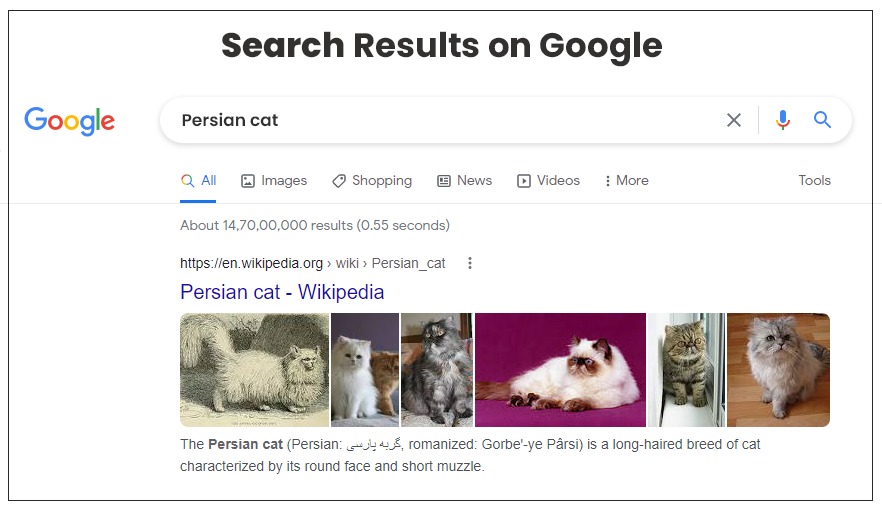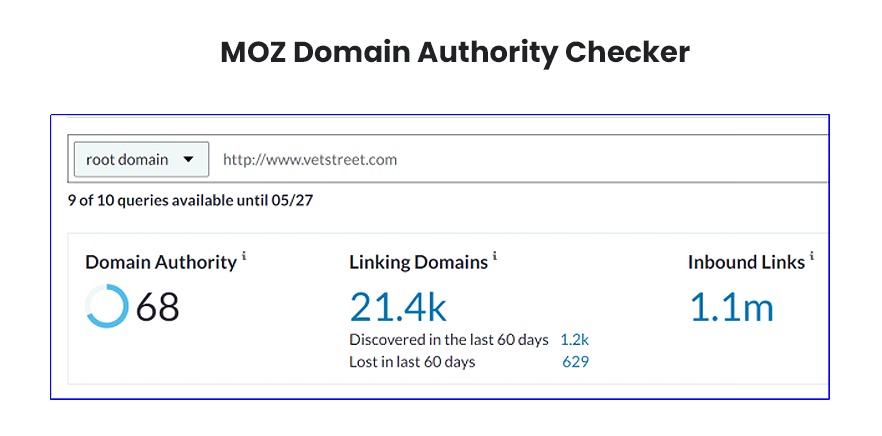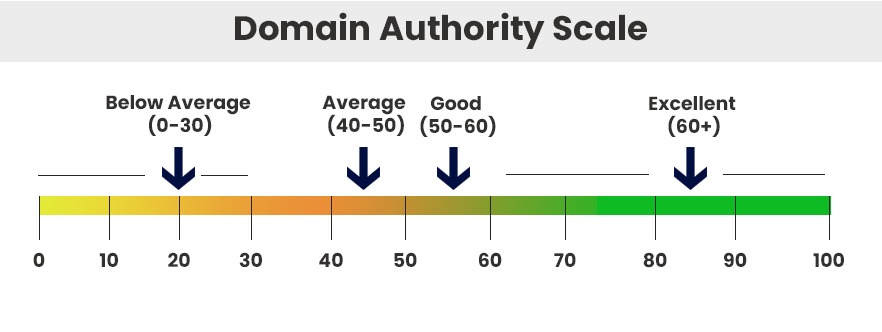
Inside this Article
Toggle- What is Domain Authority?
- Why is the domain authority (DA) of your website important?
- Is Domain Authority a Primary Google Ranking Factor?
- What Are the Other Factors for Ranking?
- Key Metric other than Domain authority
- How Domain Authority is Calculated?
- Why Not Every Website Needs a Perfect DA?
- Are All Backlinks of Equal Value?
- How to check your website domain authority score?
- In Conclusion
What is Domain Authority?
Domain Authority (DA) is a metric developed by Moz that measures the strength and credibility of a website’s domain. It is used to predict how well a website is likely to rank in search engine results. Domain authority score is ranked from 1 to 100, with 100 being the highest score.
What is DA in perspective of SEO?
The term DA is very few are aware of except maybe the SEO specialists. Everyone though knows about SEO, especially if you are a business. Let’s put DA into perspective of SEO.
Say you have a beautiful Persian cat and you have started writing blogs about her. You have used all the right keywords in your blog. In short optimized it for search engines before you hit the ‘publish’ button and sent the blog out into the wide world of the internet.
You are sure all those beautiful pictures you have added, along with ALT tags are going to draw in the readers. But then a few days later, you do a search for ‘Persian cats’ and your blog is nowhere on Google’s search result page 1 or even page 10. What went wrong? Instead, Vetstreet.com and cattime.com are in the top search results.
So, why are these larger, seemingly less optimized websites ranking higher than yours?

Digging deeper into the top search results for my same example ‘Persian cats’. I took the websites which ranked at the top in Google Search and ran their website address through a website DA checker such as MOZ DA checker and it gave me surprising insights. The top result, VetStreet, has a domain authority of 68 (have a look at the image below) and that is way higher then my blog site.
Why is the domain authority (DA) of your website important?
The top result, VetStreet, has a domain authority of 68 and that is way higher then your blog site.
This is the reason, why VetStreet and Cattime outrank your blog comes down to their Domain Authority. Websites like VetStreet have built their authority over time by accumulating high-quality backlinks from other trusted sources, establishing their credibility in the eyes of Google.
To put it simply, Domain Authority is a reflection of how much search engines trust a website. The more authoritative a website is, the easier it is for it to rank on search engine results pages (SERPs), even for competitive keywords. This explains why sites with higher DA are more likely to rank higher in search results.

Is Domain Authority a Primary Google Ranking Factor?
Let me right off the bat say that Google’s ranking factors do not use DA directly, but Domain Authority is a good indication that your website is performing well with its SEO optimization efforts. After all, Google also considers backlinks to assess which websites have higher authority and are likely to provide more valuable information to users.
When you focus on building high-quality backlinks, you’re essentially improving your Domain Authority, which in turn increases your chances of ranking higher in search results. As the authority of your website grows, your content will naturally gain more visibility, and search engines will start to trust your website more.
So, while DA isn’t an official Google ranking factor, it serves as a reliable indicator of how your website is perceived in terms of its overall SEO strength and authority.
What Are the Other Factors for Ranking?
There are 2 main factors play a crucial role for Google ranking your website higher than others for a search term and these factors are Relevance and Authority. While relevance focuses on the content, keywords, and how well they match the user’s search intent, authority focuses on how much trust your website has earned in the eyes of other websites and search engines.
1. Relevance
This refers to how well your content, keywords, and overall webpage align with the user’s query. The more relevant your content is to a specific search term, the higher the chances of ranking well. It’s about making sure that your page answers the question that users are searching for.
2. Authority
This is where Domain Authority (DA) comes into play. It’s an essential ranking factor and is determined by the trustworthiness and credibility your website has established. When other websites link back to your content, it signals to Google that your website has valuable information. This is why backlinks play such a pivotal role in SEO. The more authoritative websites link to you, the more Google trusts your site and ranks it higher. Websites like VetStreet, with over 1.1 million backlinks, are seen as credible by Google and rank higher due to their strong domain authority.
While Domain Authority (DA) is a key factor, there are a few other factors that contribute to a website’s SEO success:
3. Page Authority (PA)
This is similar to DA, but it’s specific to individual pages rather than the entire website. Page Authority reflects the likelihood of a particular page ranking on search engines based on its backlinks and relevance to a specific query.
4. Topical Authority
This refers to how well your website is recognized as an expert on a particular subject. When your website consistently produces content related to a specific niche or topic, search engines start to view your site as a trusted authority on that subject, which can improve your rankings for related keywords.
Key Metric other than Domain authority
Here are some key metrics, other than Domain Authority, that influence SEO rankings and website authority:
1. Authority Score (by SEMrush)
SEMrush’s Authority Score evaluates the overall quality and trustworthiness of a website based on factors like backlink quality, traffic, and SEO health. It also takes into account the relevance of backlinks, domain history, and spam score.
2. Domain Rating (DR) by AHREFS
Similar to DA, Domain Rating measures the strength of a website’s backlink profile. DR is based on the quantity and quality of backlinks pointing to the website, with more authoritative links boosting the score.
3. Citation Flow and Trust Flow (by Majestic)
Citation Flow measures the quantity of backlinks to a website, indicating its influence, while Trust Flow assesses the quality of those links, focusing on the trustworthiness of the linking sites. Together, they provide a balanced view of both the volume and quality of backlinks, giving a fuller picture of a website’s authority.
4. Competitive Power (by Alexa)
Alexa’s Competitive Power metric evaluates a website’s authority and competitive edge based on traffic, engagement, and backlinks. It helps to identify how a site stacks up against competitors in the same niche.
How Domain Authority is Calculated?
Domain authority is measured by the number of links to your website from other sites – in short it is calculated based on the number and quality of backlinks that your domain has aggregated.
Now that we are all clear on the importance of domain authority, here is what your domain authority score tells us about your website.

Websites like Google, Blogger, and YouTube boast impressive Domain Authority (DA) scores, often nearing 100. These sites have earned their top spots through massive traffic, valuable content, and countless backlinks from trusted sources. Similarly, sites like Facebook, Amazon, and The Washington Post also maintain DA scores in the high 90s.
Does this mean your website needs to reach such lofty DA scores to succeed in search rankings?
While it’s true that having a high DA score can be an indicator of a well-established website, aiming for a perfect DA score is not the goal for most businesses. The real objective should be to outperform your closest competitors in search rankings. For example, if your nearest competitor has a DA of 25, then your focus should be on improving your DA score to surpass theirs.
Why Not Every Website Needs a Perfect DA?
The truth is, a DA of 100 isn’t necessary to rank well. Many small businesses can rank competitively with a DA of 30, 40, or even 50, as long as they focus on the quality of their backlinks, content relevance, and other SEO factors. Google’s algorithms prioritize relevance and trustworthiness, and improving your DA is just one part of the equation.
Are All Backlinks of Equal Value?
While improving your Domain Authority (DA) through backlinks is crucial, not all backlinks are created equal. In fact, some backlinks can actually harm your website’s ranking rather than help it. This is where the quality of backlinks becomes a critical factor.
Be Cautious of Quick DA Boosts
Many websites and SEO services promise to boost your DA in a short amount of time. However, be wary of these services—they often rely on black hat SEO techniques, which involve building large numbers of low-quality backlinks. While you may see a temporary increase in your DA, these backlinks will likely be disregarded by DA rankers over time due to their poor quality. Even worse, Google might impose a manual penalty on your site, causing lasting damage.
Building high-quality backlinks is a long-term strategy, not an overnight fix. It’s important to be patient and focus on acquiring genuine, authoritative backlinks to truly improve your DA and search rankings.
How to Identify Valuable Backlinks
When it comes to backlinks, the old saying “quality over quantity” holds true. Here are some key points to look out for when evaluating backlinks:
- Dofollow Links from Trusted Sites: Dofollow links are the most valuable because they pass on SEO credit to your site. When these links come from websites with high domain authority, they are even more beneficial.
- Backlinks from Industry-Relevant Websites: A backlink from a site within your industry niche carries more weight. It signals to search engines that your website is trusted within its specific area.
- Avoid Buying Links: Never purchase backlinks. Google penalizes websites that use paid link schemes to artificially inflate their DA. Not only can this lead to penalties, but it also undermines the trustworthiness of your website.
- Anchor Text Matters: The text used in the backlink (known as anchor text) plays a crucial role in SEO. It should be descriptive and relevant to the content it’s linked to. For example, using “Click here” as anchor text provides no value. Instead, use descriptive anchor text like “Learn more about Domain Authority” to provide context to both users and search engines.
How to check your website domain authority score?
There are numerous paid tools that will do a full SEO audit including providing you valuable insights. Most of these paid tools provides a free website DA checker which you can use to check your website domain authority . The best free versions to try out are MOZ DA Checker.
If you need help perfecting your digital marketing strategy and boosting your domain authority, we are glad to help. Contact us and tell us about your project. We have run successful projects for businesses both in India and globally. We’d love to help you get to the top of the search results.
In Conclusion
Domain Authority (DA) is calculated by evaluating multiple factors, including your website’s overall link profile, the content on your site, and how it compares to competitors. It’s important to note that DA is relative, meaning it only matters when compared to other sites within the same niche.
A higher Domain Authority doesn’t guarantee that a website will rank #1 for a particular keyword, but it does indicate that the site is more likely to rank well across a variety of keywords.

Karen brings her decades-long experience in content and digital marketing to helping global brands to showcase their expertise. When she isn’t writing or caught up in being a digital marketing evangelist, you will find her passionately involved in animal rescues.






